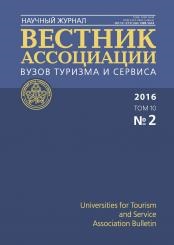The tourism development, based on domestic and entry consumer has recently become especially important in the modern Russian market of tourist services. It requires the development and implementation of new tourism business projects, effective implication of territories which were less involved before. As an example, there were taken the cities of the Moscow region for the study. The analysis of their tourist potential is evidence of little use in tourist activity and, despite the proximity to the most powerful tourist centre of the country as Moscow, weak representation in Federal target programs. Researching tourist features of the suburban cities, the authors emphasize their undeniable advantages in comparison with other Russian cities. The first block is represented with their historical role in the formation of the Russian state. Special attention is paid to the preservation of the historical environment and the possibilities for its use in tourist programs and routes. There is discussed the conservation status of 22 “historical cities”. Rich cultural and historical heritage of the cities of the Moscow region has permitted to allocate the second block of advantages, giving opportunities for the development of all types of tourism. During the analysis of existing cultural heritage objects of Federal, regional and local importance there was shown their role in attracting tourist crowds. The author presents the uniqueness and significance of museums, mansions, monuments related to the military events and other attractions of the Moscow Region. Special attention is paid to the state programs of development of tourism in the Moscow region, city unions and associations whose members are cities of the Moscow region. Evaluated approaches to solving existing problems and prospects of the developed projects concerned Социально-экономические исследования в туризме и сервисе в России и за рубежом 38 научный журнал ВЕСТНИК АССОЦИАЦИИ ВУЗОВ ТУРИЗМА И СЕРВИСА 2015 / № 3 Том 9 in general, with increasing tourist attractiveness of the Moscow region. The article uses integrated approaches to showing perspectives of tourism development in cities of the Moscow region which indicate the necessity of a unified state strategy based on the principles of sustainable development and more effective search of innovative forms of cooperation of state and municipal authorities with the involvement of private enterprises.
Moscow region, Moscow Suburbs, historical cities, state programs, cultural facilities
При рассмотрении возможностей и перспектив развития любой территории города как социально-экономические и политические центры занимают лидирующие позиции. Оценивая их географическое положение, где основополагающую роль играет «географическая геометрия» — положение относительно узлов-фокусов социально-экономического пространства [6, с. 77], особую значимость приобретает их близость к экономически развитым регионам. Однако мнение об абсолютном преимуществе такого положения далеко не всегда оправдано: «Чтобы между двумя территориями возникло взаимодействие, должен существовать спрос» [4]. Поэтому стратегия отношений между ними выстраивается при неизбежном лидерстве одногоиз них.
1. Adashova T. A. Malye goroda Podmoskov´ya: nekotorye aspekty razvitiya turizma. Sovremennye goroda: problemy i perspektivy razvitiya: Materialy Vserossiyskoy nauchno-prakticheskoy konferentsii / Pod red. B. M. Beroeva, Z. Yu. Kaloevoy, Z. P. Okazovoy; Sev. - Oset. gos. un-t im. K. L. Khetagurova. Vladikavkaz: Izd-vo SOGU, 2013. s. 348-353.
2. Aktual´nye problemy izucheniya turistskikh resursov RF na osnove primeneniya sovremennykh informatsionnykh tekhnologiy / Dzhandzhugazova E. A., Adashova T. A., Val´kova T. M. Pod red. prof. Dzhandzhugazovoy E. A. M.: Izd-vo RGUTiS, 2012. 92 s. 3. Bunge V. Teoreticheskaya geografiya / Pod red. V. M. Gokhmana. M.: Progress, 1967.
3. Zubarevich N. V. Sotsial´noe razvitie regionov Rossii v perekhodnyy period. Vestnik Mosk. un-ta, ser. 5, geogr. 2002. № 6. S. 56-61.
4. Kanarskaya O. A. K voprosu o roli malykh gorodov v razvitii sotsial´no-ekonomicheskoy sistemy Rossiyskoy Federatsii //Vestnik TISBI. 2008. № 2.
5. Lappo G. M. Geografiya gorodov. M.: Vlados, 1997. 480 s.
6. Makhrova A., Nefedova T., Treyvish A. Moskva: megapolis? aglomeratsiya? megalopolis? //Demoskop Weekly (elektronnyy zhurnal). 2012. № 517-518 (1-19 avgusta). DOI: http://www.demoscope.ru/weekly/2012/0517/tema01.php (data obrashcheniya: 12.02.2015).
7. Makhrova A. Beskraynyaya Moskva: faktory rosta i razvitiya. 2013. URL: http://ecpol.ru/2012-04-05-13-41-25/2012-04-05-13-41-42/748-beskrajnyaya-moskvafaktory-rosta-i-razvitiya.html (data obrashcheniya: 12.02.2015).
8. Yas´kova T. I. Stolichnyy region i pristolichnoe polozhenie: sootnoshenie ponyatiy//Regional´nye issledovaniya. 2008. № 3 (18). S. 29-34.
9. Agamirova A. V., Adashova T. A., Vaokova T. M., Kosarena N. V., Lapochkina V. V. Event-calendar: event as the basisof the territory tourist attractiveness. 1097-8135 Life Science Journal - Scopus; CJR2012 (Thomson Reuters) 2014, 11 (11). http://www.lifesciencesite.com/lsj/life1111/126_26160life111114_687_689.pdf. (data obrashcheniya 03.02.2015).





